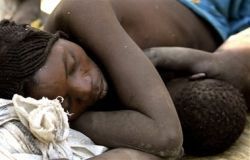Sudan refugees may become heavy burden for Chad – UN
March 27, 2007 (ABECHE, Chad) — The growing number of refugees fleeing to Chad from the conflict-ridden Sudan could become an “intolerable burden” on the country, the U.N.’s humanitarian chief said.
 John Holmes visited this eastern Chad town on the second leg of a 10-day trip to the region, one week after the new U.N. undersecretary general for humanitarian affairs visited Darfur and South Sudan – part of an effort to improve the bitter conditions under which aid workers have to operate.
John Holmes visited this eastern Chad town on the second leg of a 10-day trip to the region, one week after the new U.N. undersecretary general for humanitarian affairs visited Darfur and South Sudan – part of an effort to improve the bitter conditions under which aid workers have to operate.
“The camps could become an intolerable burden” on eastern Chad’s scarce natural resources, Holmes said.
Violence has increasingly been spreading from Darfur into Chad. Nomads are raiding villages, there are intricate ethnic clashes and both the Chadian and the Sudanese governments have been trading accusations that they support each other’s rebels groups.
“But one big difference between here and Sudan is that at least here authorities are very cooperative,” with the international aid effort, Holmes said after meeting Touka Ramadan Kore, the governor of this eastern Chad region. “Their humanitarian needs are so big that they are happy to have us in the country.”
More than 200,000 people have been killed in Darfur during four years of fighting between local rebels, the Sudanese army and their allied janjaweed militias. Over 2 million live in refugee camps scattered over the vast arid region, while another 230,000 now live in refugee camps on the Chadian side of the border.
But janjaweed raids and fighting by rebels along the 1,300 kilometer border has also spread the crisis into Chad itself, and about 140,000 Chadians moved to the refugee camps after their villages were destroyed.
Holmes said he was aware there were situations where refugee camps offered better living conditions than surrounding villages, which was creating tensions.
“We need to have an integrated approach to the whole region,” said Holmes. One of the things he talked about with local authorities was how to ensure natural resources such as water and firewood, along with international aid, were fairly shared by local villagers and refugees.
Aid workers in eastern Chad said they felt they were managing to cope with the refugees from Sudan, but were now more worried with the increasing number of Chadian ones.
“The trend is not going down, because insecurity is still increasing,” Kingsley Amanin, the U.N.’s humanitarian coordinator in Abeche, said of the internally displaced. “It’s worrying because we simply don’t have the resources to help them right now.”
Chadian authorities, who provide protection to the refugee camps and often share a common ethnic background with people fleeing from Darfur, said they hoped Holmes’ visit would help raise awareness to the crisis their region is facing.
“Our relations with the U.N. is very good,” said Guede Borgou, the chief of staff for eastern Chad’s governor. He said he hoped Holmes’ visit would further boost cooperation. “It comes at a time when we really need it,” he said.
The Sudanese army bombed a border zone with Chad earlier this month and aid workers fear the flow of refugees will only increase.
The Security Council has made plans to deploy 11,000 U.N. peacekeepers along the border to protect refugees, but Chad’s President Idriss Deby has seemed uncertain about his recent approval for a military component to the mission.
Holmes said his brief didn’t include discussions on the peacekeeping mission but said that “deploying a force along the border is a priority” and hoped it would occur soon.
(AP)
